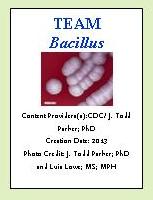Bacillus Bacteria: Some are Deadly, Some are Probiotics???
 |
Bacillus is a genus of Gram-positive, rod-shaped bacteria that is found widespread in the environment. As a result, they are often called “soil organisms” or "soil bacteria", although they can be found in soil, water, dust, air and feces. This genus is composed of approximately 77 very different species of bacteria. |
Some, but not all, of the species are:
- Used in industrial applications such as enzyme production, antimicrobial production, acid production and GMO (genetically-modified organism) crops
- Used as probiotics
- Food spoilers
- Deadly
What makes these microbes unusual in the beneficial bacteria probiotics world is that the bacteria form endospores under stressful conditions. These endospores have tough outer coatings that protect the dormant bacteria inside.
This protection can last for years and can be resistant to extreme heat, radiation, extreme freezing, drying, and chemical disinfectants. When conditions are favorable for growth, the endospore converts to a vegetative cell which can thrive.
Most, but not all, of these bacteria are motile, meaning they can independently move, thanks to a whip-like appendage called a flagellum.
This species of bacteria is in the same class of microbes as Lactobacillus, so some genes are common between the two species.
What Do You Need to Know for Your Safety?
Spores of Bacillus bacteria are regularly consumed by animals and humans inadvertently through their foods and drinks and in some fermented foods. There is some concern that although these spores may be regularly consumed accidentally, intentionally taking billions of them everyday as probiotics floods the intestines and may lead to an unnatural state in the intestines since they are not resident bacteria.
Although many effects of this genus of bacteria is not only species-dependent, but also strain-dependent, one important commonality among the bacteria in this genus is that they can stimulate the immune system. This may be good or bad, depending on the circumstances.
Additionally, the genus Bacillus is known to be able to acquire plasmids from other bacteria in the environment. These plasmids can be harmless or may contain information for antibiotic-resistance or toxin production. Also, some species of Bacillus used as probiotics have antibiotic resistance, so you would want to inform your healthcare provider if you are taking them.
It used to be thought that the spores of the probiotic Bacillus species passed through the stomach and germinated in the small intestine into vegetative cells which, in turn, changed back into spore form once they reached the colon where they were then eliminated. It is now known that the processes are more complicated:
- Many of them are activated by stomach acid to begin their transformation.
- The vegetative cells survive and produce their by-products of enzymes, antimicrobials, etc.
- The vegetative cells re-sporulate once conditions are not favorable.
- The spores can persist in the intestines for periods of time, stimulate the immune system and even translocate out of the intestine into mesenteric lymph nodes (MSN's) and the spleen in mice and blood and tissues in people.
- These translocated spores are capable of turning back into growing, vegetative cells once out of the harsh intestinal environment in places like the MSN's, spleen and other tissues. In many cases, the body's immune system destroys them but infections may ensue.
- The spores are not thought to permanently establish themselves in the intestine.
The most important thing to know about Bacillus probiotics is that identification of the strain is very important because mislabeling occurs.
Which Are the Better-Known Bacillus Species?
Some of the famous and infamous species include:
- B. anthracis, the deadly agent of anthrax disease. All strains are pathogens.
- B. cereus, a species with harmful (usually associated with food poisoning and opportunistic infections) and useful strains (used for fungus and bacterial control on crops)
- B. coagulans, with many strains used as probiotics or for industrial applications, but some with harmful toxin production
- B. indicus, an interesting species with pigmented spores and vegetative cells
- B. licheniformis, another species with harmful (usually associated with food poisoning and opportunistic infections) and useful strains (industrial, food industry, probiotic, veterinary and medical applications)
- B. subtilis, a species with probiotic strains, food industry usage (including natto), GMO usage, and industrial applications as well as harmful toxin-producing strains and opportunistic-infection strains
- B. thuringiensis, source of the Bt toxin that is used as a pesticide and in some GMO crops such as corn, cotton, canola and soy.
Since this site is about probiotics, more information can be found on these species:
I research studies and share my clinical experience to write this free site to help you find solutions to your problems. As part of that, I recommend products and services that I genuinely believe will be of help to you. If you click on a link to a product/service, I may receive a small commission to support my efforts if you buy something. The item does not cost you more.
Thanks for visiting this site! If you've enjoyed reading this page or have found the information to be useful to you, please "like", tweet about it, or share it so others can benefit, too. You can leave comments below via Facebook or Disqus.
Comment with Disqus (including as a guest), Twitter or Google accounts:
If you are one of my many readers without a Facebook account, you can still comment.
Disclaimer: Please note: By law, I cannot provide any personalized recommendations for your specific health concern on this site. The information contained in this site is educational in nature and is not intended as diagnosis, treatment, prescription or cure for any physical or mental disease, nor is it intended as a substitute for regular medical care. Consult with your doctor regarding any health or medical concerns you may have.
Subscribe to my monthly newsletter and receive a free copy of "How to Use Probiotics to Lose Weight and Be Healthier".

To comply with the EU's GDPR data privacy regulation, please subscribe here:
Looking for some quality professional supplements, including probiotics? Check out my online dispensary, as I will be doing reviews of some of these products in the future. Click on the Fullscript picture. (Note: If you were a former Wellevate customer, please switch to Fullscript for a better customer experience. Thanks!)
Some competitors of SBI (Solo Build It) are posting fake negative reviews of SBI. If you are considering creating your own website business, or if you have a brick-and-mortar business but want an online presence, I highly recommend SBI!





Comment with Facebook!
I'd love to hear your opinion about what you just read. Leave me a comment in the box below! Other commenting options follow the Facebook comments.